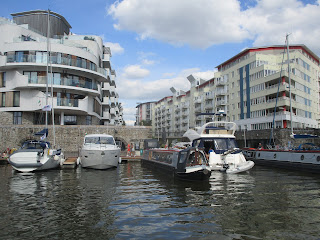Saturday 22nd
June 2019
We were treated to a real spectacle this morning when no fewer than
seven boats, travelling in convoy, all descended on the moorings, jostling to moor
up. They had travelled across from Penarth the previous day and from Portishead
this morning. Amongst them were three yachts and four cruisers, two of them huge
things. One moored next to us was called “Our Eva”. She has twin 230hp engines and
burns 120ltrs of fuel per day. We have used about 400 in a year.
After breakfast, we explored the Old City around the Cathedral and
Park Street. While the exterior of the Cathedral is quite plain, the interior
is a complete contrast and is surprisingly dramatic after viewing outside. It
is a “hall” church and said to be one of the finest examples in the world; the
nave, choir and aisles are all of the same height. Since buying and reading a
book on “green men” sculptures found in churches, we had been looking, and found,
our first one in the Lady’s Chapel.
Cathedral, College Green and City
Hall
College Green, outside the cathedral, is a very pleasant green area
dominated on one side by the cathedral, and on the other by Bristol City Hall.
We walked up Park Street with its arcades of Georgian shops and into Great
George Street where we visited the Georgian House, an 18th century
West Indian merchants house, furnished in the style of the period. A fascinating
place. The house was originally owned by one John Piny, a sugar trader who owned
lands and slaves in the Caribbean.
Georgian House
Bristol of course, owes its 18th and 19th
century prosperity and importance to the slave trade, along with Liverpool.
Bristol at this time, was the third largest port in Britain. Bristol was a part
of the “triangular trade”, whereby cheap goods were traded to African ports in exchange
for slaves. These slaves were transported to American and Caribbean plantations
and rich cargoes of tobacco, timber, rum, cotton and sugar were brought home. This
trade has left Bristol with its rich legacy of Renaissance buildings, from wealthy
merchants houses to country houses and suburban villas.
Carrying on up Great George Street we came to Brandon Hill, a park
with its landscaped gardens, water features and topped by the Cabot Tower. The
views from here, over the city, are stunning. We stopped in glorious sunshine
enjoying the view with an artisan ice cream.
Renaissance style
terrace in Great Charlotte Street
By now, Harvey was flagging in the heat, so we returned, slowly, to
the boat.
In the evening, we again enjoying watching all the crowds of people enjoying
themselves.
Weather: hot and a glorious evening.










Comments
Post a Comment